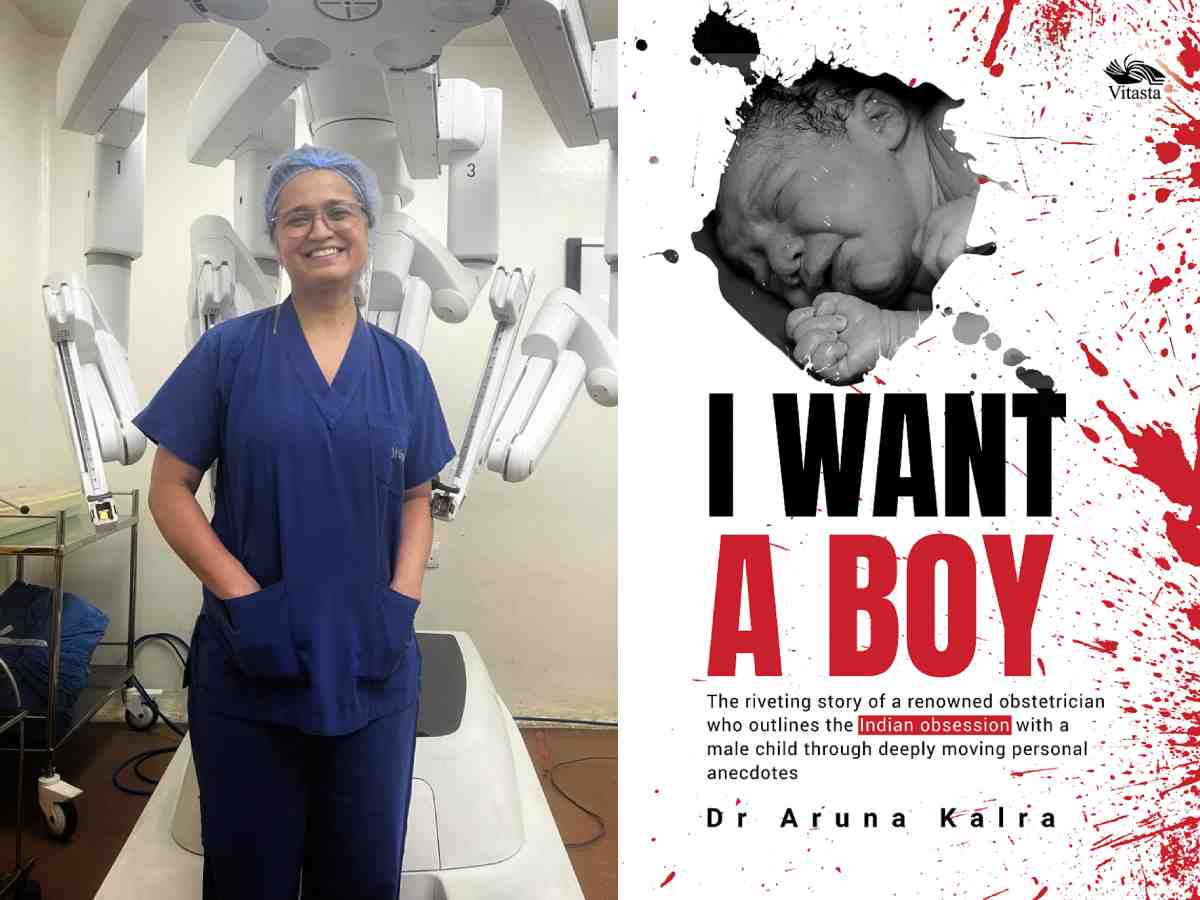
Book Name – I Want a Boy
Author – Dr Aruna Kalra
Publisher – Vitasta Publications
Dr Aruna Kalra’s memoir, I Want a Boy, delves into India’s deep-seated obsession with having sons, revealing its devastating consequences—including female foeticide, infanticide, and the harsh realities within hospitals and the broader healthcare system.
Kalra, a distinguished obstetrician and gynaecologist based in Gurgaon, has witnessed many deeply unsettling incidents over her 25 years of service. I Want a Boy serves as a repository of these events.
However, the book goes beyond merely recounting these tragic tales, offering critical commentary on women being reduced to mere vessels for producing sons and the suffering they endure when they give birth to daughters.
One particular incident that left Kalra dazed when she saw a woman delivering in the bathroom of a labour ward and attempting to harm the child upon realising it was a baby girl.
Another incident involved a new mother named Sundari, which took place in the operating theatre. Kalra recounts how the doctor shouted to Sundari to look at her baby, holding the newborn girl upside down by her tiny feet. When the doctor asked whether the baby was a boy or a girl, Sundari remained silent, her gaze averted from her daughter and seemingly unwilling to acknowledge the baby’s presence. Exasperated, the doctor shouted again, demanding Sundari confirm the baby’s sex. The baby, still attached to the placenta by her umbilical cord, hung in the doctor’s right hand. Sundari’s refusal to respond delayed the cutting of the cord, risking the baby’s life due to excess blood from the placenta.
From diary to debut book
“I felt overwhelmed, each incident leaving me shaken to my core. I would cry incessantly as the stories began to accumulate,” Kalra shares. “To cope, I started keeping a diary, documenting everything I witnessed in a manner akin to journaling.”
As the world slowed down during the pandemic, she revisited the stories she had been documenting over the years. “I realised these stories needed to be shared. That’s how the idea for the book came to me.”
“I began compiling these stories during the pandemic and sent draft copies to various publishing houses. Most major publishers rejected the manuscript outright, claiming it would be too sad and depressing for their readers. I am unsure whether they even read the drafts.”
However, in 2020, Kalra found a publishing professional who recognised the emotional impact of her stories and suggested breaking them down into chapters. With this guidance, she restructured her book.
Also read: Recalling the Bollywood showdown for New Delhi: Kaka vs Shotgun
Glowing reviews, deep insights
The impact of I Want a Boy has been profound, garnering widespread acclaim from readers and critics alike, with reviews calling it an “eye-opener” and a “powerful commentary” on gender discrimination.
Critics have particularly highlighted Kalra’s keen insights into the issues she has addressed in the book. For example, Kalra explores how different socioeconomic strata in India harbour a preference for male children, though for distinct reasons. Among the poorest, the desire for a boy often stems from traditional views on lineage and the belief that a son will carry forward the family name and provide security in old age. Conversely, the wealthy elite seek male heirs to inherit and manage their business and wealth, perpetuating their economic and social status. Both sections of society, despite their varying motivations, reflect a pervasive and problematic preference for sons.
In another instance, I Want a Boy adeptly reveals that the aversion to a girl child does not stem solely from patriarchy but also from a broader societal fear for the safety of daughters.
Beyond the pages
Kalra’s dedication to women’s rights extends far beyond the pages of her book. In her clinic, she seamlessly integrates medical care with advocacy and education. Her work transcends treating patients; she is committed to empowering women and tackling gender disparities on multiple levels.
Also read: Can Delhi think beyond caste, regional lines while voting in 2024 Lok Sabha election?
Kalra notes from her experience that almost all the women desire a boy. When they deliver a girl, their families often neglect them, failing to provide clean clothes or proper food. She found this disheartening, especially since she grew up in a family where her father never made her or her sister feel inferior because of their gender. Kalra reflects that it was perhaps the values instilled by her father that inspired her to take action rather than succumb to despair.
“My work in the hospital and my clinic is deeply intertwined with my advocacy. Every patient interaction is an opportunity to educate and challenge existing norms. I believe that by confronting these issues directly, we can create meaningful change in the lives of women.”
The boy sustained grievous injuries after being stabbed in the head, a senior police officer…
On February 1, the Delhi government issued a gazette notification to ease implementation of its…
A three-day bazaar in Hauz Khas will showcase Bengal’s textiles, craft-led design and regional cuisine
Station renamed after Ram temple following long-standing local demand; revised name now in effect
Gautam Gambhir lauded Yadav’s calm leadership in the T20 World Cup, saying the skipper’s composure…
Chief Minister Rekha Gupta inaugurated Rs 31 crore medical facilities, including a CT scanner and…